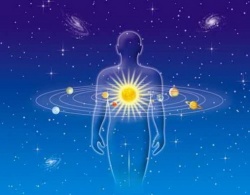Difference between revisions of "Trichiliocosm"
| Line 1: | Line 1: | ||
[[File:Ma31.jpg|thumb|250px|]] | [[File:Ma31.jpg|thumb|250px|]] | ||
| − | [[Trichiliocosm]] (Tib. [[tong sum]]; Wyl. [[stong gsum]]) — following {{Wiki|ancient}} [[Indian]] [[cosmology]], the [[Buddhist]] [[Abhidharma]] {{Wiki|literature}} explains that there are an [[infinite]] number of [[worlds]]. | + | [[Trichiliocosm]] (Tib. [[tong sum]]; [[Wyl.]] [[stong gsum]]) — following {{Wiki|ancient}} [[Indian]] [[cosmology]], the [[Buddhist]] [[Abhidharma]] {{Wiki|literature}} explains that there are an [[infinite]] number of [[worlds]]. |
| − | Each [[world]] has at its centre a [[Mount Meru]] surrounded by seven oceans and seven rings of golden mountains separating them. Outside are the [[four continents]] and eight subcontinents (two out at sea, left and right of each of the continents). We [[humans]] [[live]] on the southern continent called “[[Jambudvipa]]”. This entire [[world]] is then surrounded by the outer iron mountains. | + | Each [[world]] has at its centre a [[Mount Meru]] surrounded by seven oceans and [[seven rings of golden mountains]] separating them. Outside are the [[four continents]] and [[eight subcontinents]] (two out at sea, left and right of each of the continents). We [[humans]] [[live]] on the [[southern continent]] called “[[Jambudvipa]]”. This entire [[world]] is then surrounded by the outer {{Wiki|iron}} [[mountains]]. |
| − | One thousand of such [[worlds]] constitute a 'thousandfold [[world]] system' (Skt. [[sāhasracūḍikalokadhātu]]). A thousand of these makes up a 'second-order thousandfold [[world]] system' (Skt. [[dvitīyamadhyama sāhasralokadhātu]]). Then, when multiplied a thousand times further, this makes a 'third-order world system' or '[[trichiliocosm]]', a [[universe]] of a billion [[worlds]] (Skt. [[trisāhasra mahāssāhasralokadhātu]]; Wyl. [[stong gsum gyi 'jig rten khams]]). It is said that a single [[supreme]] [[nirmanakaya]] [[buddha]] has [[mastery]] over such a [[world]] system. | + | One thousand of such [[worlds]] constitute a 'thousandfold [[world]] system' (Skt. [[sāhasracūḍikalokadhātu]]). A thousand of these makes up a 'second-order thousandfold [[world]] system' (Skt. [[dvitīyamadhyama sāhasralokadhātu]]). Then, when multiplied a thousand times further, this makes a 'third-order [[world]] system' or '[[trichiliocosm]]', a [[universe]] of a billion [[worlds]] (Skt. [[trisāhasra mahāssāhasralokadhātu]]; [[Wyl.]] [[stong gsum gyi 'jig rten khams]]). It is said that a single [[supreme]] [[nirmanakaya]] [[buddha]] has [[mastery]] over such a [[world]] system. |
==Alternative Terms/Translations== | ==Alternative Terms/Translations== | ||
Latest revision as of 14:42, 1 September 2014
Trichiliocosm (Tib. tong sum; Wyl. stong gsum) — following ancient Indian cosmology, the Buddhist Abhidharma literature explains that there are an infinite number of worlds.
Each world has at its centre a Mount Meru surrounded by seven oceans and seven rings of golden mountains separating them. Outside are the four continents and eight subcontinents (two out at sea, left and right of each of the continents). We humans live on the southern continent called “Jambudvipa”. This entire world is then surrounded by the outer iron mountains.
One thousand of such worlds constitute a 'thousandfold world system' (Skt. sāhasracūḍikalokadhātu). A thousand of these makes up a 'second-order thousandfold world system' (Skt. dvitīyamadhyama sāhasralokadhātu). Then, when multiplied a thousand times further, this makes a 'third-order world system' or 'trichiliocosm', a universe of a billion worlds (Skt. trisāhasra mahāssāhasralokadhātu; Wyl. stong gsum gyi 'jig rten khams). It is said that a single supreme nirmanakaya buddha has mastery over such a world system.
Alternative Terms/Translations
- a billion-fold universe
- a third-order thousand world system
- a third-order great universal system of one thousand million worlds
- a cosmos of a billion universes
- a billion-fold world-system
See Also
Further Reading
- Jamgön Kongtrul, Myriad Worlds (Ithaca: Snow Lion, 1995), pages 102-3.
